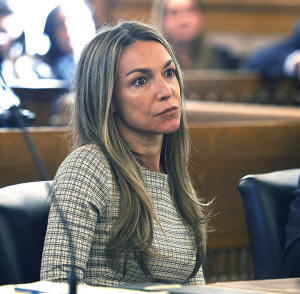Massachusetts top court rules Karen Read can be retried in her
boyfriend's death
 Send a link to a friend
Send a link to a friend
 [February 12, 2025]
By MICHAEL CASEY [February 12, 2025]
By MICHAEL CASEY
BOSTON (AP) — The state’s top court ruled Tuesday that Karen Read can be
retried on all the same charges in the death of her Boston police
officer boyfriend, the latest twist in the long-running case that
transfixed true crime fans nationwide.
Prosecutors have sought to retry Read this year on charges of
second-degree murder, manslaughter and leaving the scene of a crime.
They accused her of ramming into John O’Keefe with her SUV and leaving
him to die in a snowstorm in January 2022. Read’s attorneys argue she
was framed to protect other law enforcement officers involved in
O’Keefe’s death.
A judge declared a mistrial in June after finding jurors couldn’t reach
an agreement, without polling the jurors to confirm their conclusions.
Read’s attorney Martin Weinberg argued that five jurors later said they
were deadlocked only on the manslaughter count, and had unanimously
agreed in the jury room that she wasn’t guilty on the charges of
second-degree murder and leaving the scene. But they hadn’t told the
judge.
The ruling from the Massachusetts Supreme Judicial Court clears the way
for a new trial on all three charges.
“The jury clearly stated during deliberations that they had not reached
a unanimous verdict on any of the charges and could not do so. Only
after being discharged did some individual jurors communicate a
different supposed outcome, contradicting their prior notes,” the judges
wrote. “Such posttrial disclosures cannot retroactively alter the
trial’s outcome -- either to acquit or to convict.”

The judges also found “no abuse of discretion” in Judge Beverly
Cannone's decision to declare a mistrial.
“After extensive, multiday deliberations, the jury submitted several
increasingly emphatic notes about their inability to reach a unanimous
verdict," they wrote, adding that the record before the judge “suggested
complete deadlock.”
Read's lawyer said they're considering their legal options.
“While we have great respect for the Commonwealth’s highest court,
Double Jeopardy is a federal constitutional right," Weinberg said in a
statement. "We are strongly considering whether to seek federal habeas
relief from what we continue to contend are violations of Ms. Read’s
federally guaranteed constitutional rights.”
A spokesman for the Norfolk District Attorney's Office said it would
have no comment on the ruling.
As for Read, she told Boston 25 News in an interview which ran Monday
that she's ready for a second trial and isn't worried about who's on the
prosecution team.
[to top of second column]
|

Karen Read and her defense team and the prosecution file
motions in Norfolk Superior Court in Dedham, Mass., Nov. 13, 2024
(Greg Derr/The Patriot Ledger via AP, Pool, file)

“I don't care who I face,” she told the station. “I have the truth.
I have the best attorneys. Do your worst.”
Read could end up in prison — a fate she said she “thinks about that
every day," but she said "it doesn't frighten me the way it did
three years ago.”
Weinberg had urged the court to allow an a evidentiary hearing where
jurors could be asked whether they had reached final not guilty
verdicts on any of the charges.
Prosecutors maintained there’s no basis for dismissing the charges
of second-degree murder and leaving the scene. They argued that her
lawyers should have sensed a mistrial was “inevitable or
unavoidable” and that they had every opportunity to be heard in the
trial courtroom.
The judges questioned Weinberg over the the merits for holding an
inquiry. Associate Justice Frank Gaziano noted that such inquiries
are usually reserved for “extraneous information” such as “racisms
in the jury room." Chief Justice Kimberly Budd wondered about the
limits of allowing an inquiry, which she suggested could open the
door for other defendants to argue a juror came to them to say
“that’s not really what happened.”
Cannone ruled in August that Read could be retried on all three
charges.
“Where there was no verdict announced in open court here, retrial of
the defendant does not violate the principle of double jeopardy,”
Cannone said.
Prosecutors said Read, a former adjunct professor at Bentley
College, and O’Keefe, a 16-year member of the Boston police, had
been drinking heavily before she dropped him off at a party at the
home of Brian Albert, a fellow Boston officer. They said she hit him
with her SUV before driving away. An autopsy found O’Keefe had died
of hypothermia and blunt force trauma.
The defense portrayed Read as the victim, saying O’Keefe was
actually killed inside Albert’s home and then dragged outside. They
argued that investigators focused on Read because she was a
“convenient outsider” who saved them from having to consider law
enforcement officers as suspects.
All contents © copyright 2025 Associated Press. All rights reserved
 |